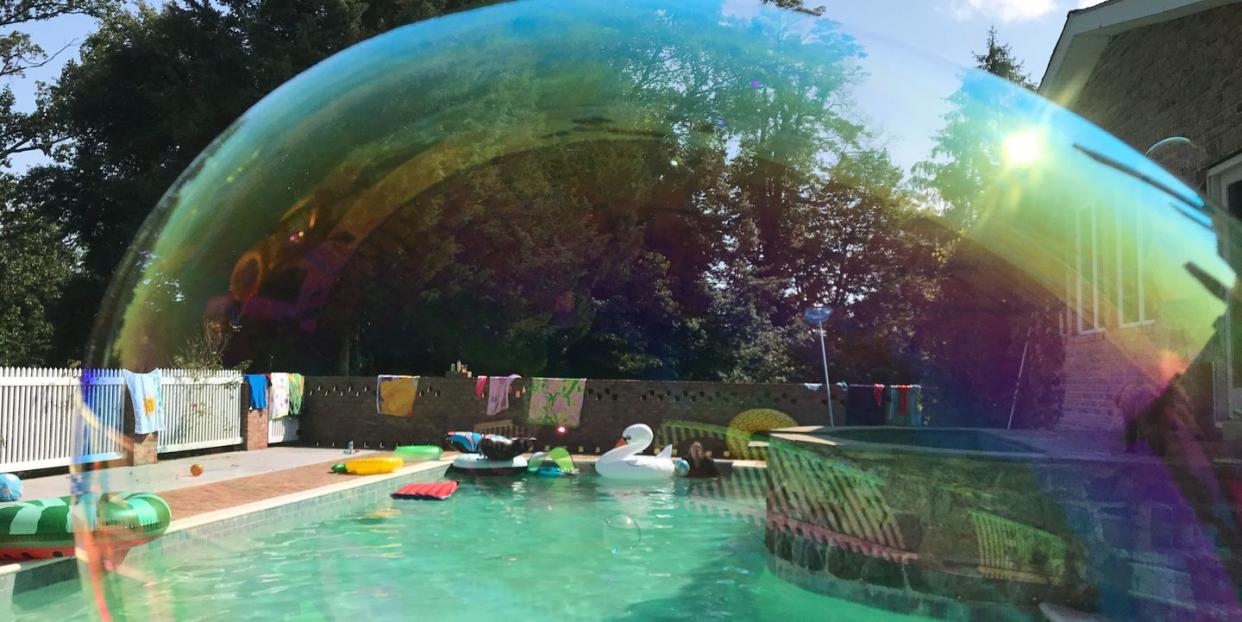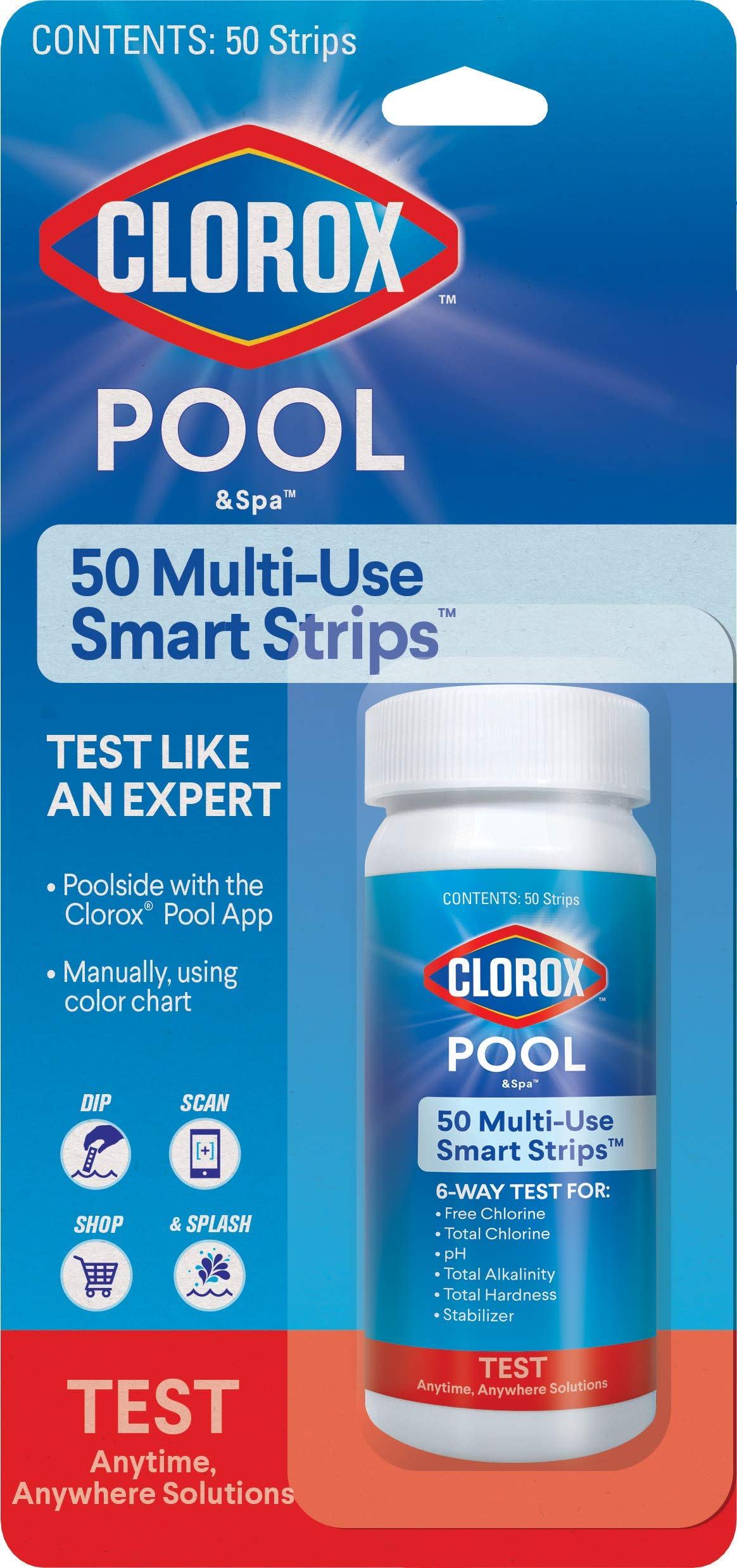Can Your Pool Make You Sick?

"Hearst Magazines and Yahoo may earn commission or revenue on some items through these links."
As temperatures begin to heat up, you're long overdue to dive into that pool in your backyard. But you're going to want to give it another look before diving in. Don't let the chlorine-blue water fool you! If you are hesitant to swim in public pools, don't get smug; it is likely that your fear of what could be lurking in the community pool water is crashing the private pool party in your backyard. To keep your head above worrying during your next pool party, we tapped experts to tell us everything you need to know about just how clean your pool is—and whether or not your pool can make you sick if it's dirty.
"Without the sufficient concentration of chlorine, the pool is essentially another ecosystem that can support all sorts of microbes. Add in the human factor over the course of days or weeks and the levels of bacteria will rise far past those that are considered to be safe," says microbiologist Jason Tetro, author of The Germ Code and The Germ Files. If that happens, you could get anything from an ear infection to norovirus.
But everything will be fine if you know what to look out for! Take heed of the signs below, which indicate a pool is unsafe for swimming, and practice proper pool maintenance, and you're crystal clear to float all summer long in peace.

Warning Signs That You Need to Clean Your Pool
To avoid swimming with unwelcome bacterial guests in your pool, keep your eyes sense sharp—look for funky colors, and sniff around for unusual odors. Jimmie Meece, Brand President of America’s Swimming Pool Company, says, "Without maintenance, a pool can develop algae, foul odors, slimy or cloudy water, and cause itchy skin and burning eyes. Some signs to look out for are cloudy water, no circulation, and a strong chemical smell." Stay alert for the following signs:
It looks off.
A green, yellow, or brown tint to your pool indicates it is time to scrap the party plans. The lack of visibility in the pool is also sign of an immediate threat, especially if you're preparing the pool for your children who need to be visible at all times).
It smells.
There's a common belief that the smell of chemicals proves the pool is clean, thanks to the the presence of chlorine. On the contrary, if you smell chemicals, the pool actually needs more chlorine, as the chemical smells come from the lotion, sunscreen, urine, hair oils in the pool mixing with a low level of chlorine, says Tetro.
If you live in an area that receives a lot of sunlight, algae in the pool can produce bacteria and release a bad odor. Brian Trenck, Manager of Technical Services at Easy 1 2 3 Pool Care, LLC states, "Corners, steps, and ladders are common locations where problems like algae can start and then spread to the rest of the pool." Large amounts of algae can require you to drain and refill your pool.
The water is stagnant.
Another way to detect if something is amiss in your pool is the lack of poor circulation and water flow. A dirty filter causes the water to be stagnant and the chemical treatments do not disperse evenly in the pool water. "Pool and spa return jets are where water returns from the pump and filters into the body of water. If a large drop in water pressure coming from the jets is noticed, that is a good sign that there is a physical issue with the pool or spa," Trenck advises.
Sure, it's obvious to fish out the leaves and debris that float at the top of your pool, but also look for a large amount of bubbles, which can be the fermentation of bacteria as a result of body lotion, sunscreen, and hair oils that enter the water.
How Often Should You Clean Your Pool?
Maintenance is the key to a successful summer of fun in the sun. "Weekly pool maintenance is ideal for ensuring satisfactory water chemistry, sanitation, and overall appearance of your pool. If left untreated, your pool water could grow algae blooms or become a breeding ground for mosquitoes and serious bacteria like E.Coli," Meece explains.
According to Trenck, dip and read test strips are a perfect solution for homeowners looking for an easy-to-use, fast, and reliable method for monitoring sanitizer residuals and water balance. "The number one way to determine the water quality of a pool or spa is by testing. Routine water testing should occur at least twice a week, but it is also helpful to check the pool/hot tub water after heavy use or a bout with inclement weather," he says. "Properly chlorinated pools have less than 10 bacteria per mL but without chlorine (or underchlorinated) can have between 100 and 500 bacteria per mL."

Pool & Spa Smart Strips
$13.49
amazon.com
You'll also want to make sure your water is being filtered continuously. "Most pools have a pressure gauge located on the filter and manufacturers recommend backwashing or rinsing when pressures rise above 10 psi above normal operating pressure," Trenck continues. "It is also a good practice to replace gauges every year to ensure they are working properly."
Tetro adds, "You should also change the filter as per the guidelines as well as disinfect any surfaces that are not fully submerged. These areas can allow bacteria such as Pseudomonas aeruginosa to grow—this species can form microbial colonies known as biofilms that can help other microbial species to stick around including E. coli and norovirus." This bacteria is the red flag of common bacteria that affects children leading to rashes, itchiness, and swimmer's ear.
Ashley Murphy, The Home Depot's Fire and Pool Merchant says, "Your pool pump should be set to run for a minimum of eight to 12 hours per day. The best models work to force water through the pool filter system and push the clean water back into the pool."
When Is it Time to Hire a Professional?
"A pool requires three elements: circulation, chemistry, and cleanliness. But if there are lapses in one of these, then it may be well worth taking a day out of the pool to make it safe for tomorrow," Tetro advises.
When cleanup beyond using your pool skimmer or rake seems like a major beast, hire a professional to check that your pool is up to standards for usage. If you are well-versed in cleaning your pool but haven't done so in a while, it's time to check in with a pro to give your pool the deep clean it deserves. "A professional is always a good choice when it comes to a swimming pool. They can do a proper inspection and look for signs that may go overlooked by homeowners," says Tetro.
Hire a professional service late spring to get your pool ready for summer. The experts can perform maintenance checks, and repair or replace equipment. "Taking care of your pool is something you can do yourself with the right tools and equipment," Murphy says. For that,your pool vacuum is a great tool to have. But, she adds, "You could always use a professional to clean your pool annually or twice a year." It's a little like brushing your teeth, but still seeing the dentist for deep cleaning.
Murphy also advises using a pool cover when the pool is not in use to prevent debris from falling into the water, protect your pool from UV rays and extend the life of the water. Whether it's above ground or brand new fiberglass, your pool is an investment in enjoying leisure time in your household. Save money and time by prioritizing safety—which includes cleanliness—first.
You love experts giving inside tips on how to take care of your home. So do we. Let’s learn together.
Follow House Beautiful on Instagram.
You Might Also Like
